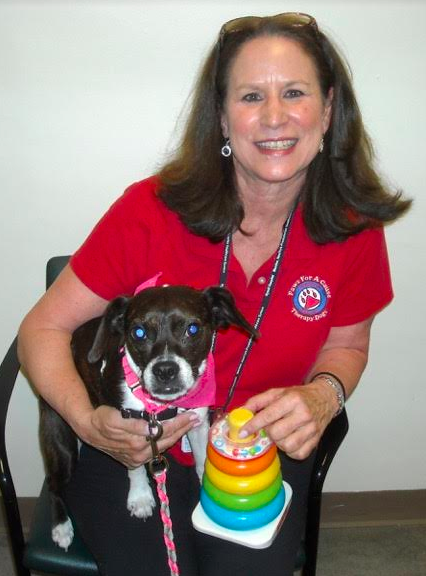Animal-assisted therapy is a growing field that uses dogs or other animals to help people recover from or better cope with health problems, such as heart disease, cancer and mental health disorders.
“The Pet Therapy Program provides patients, families and staff with the opportunity to benefit from pet therapy experiences during their hospital stay,” Director of Volunteers Helen Hayes-Perkins said. “Interacting with Karen and her friendly pet Sophie can help patients with many physical and mental issues. It can help reduce blood pressure, stress, anxiety and depression and increase socialization. Pet therapy can produce a calming effect. It is useful for people undergoing chemotherapy, stroke patients and those having physical therapy.
“Karen and Sophie are very dedicated volunteers at the hospital,” she continued. “When I receive a phone call from a family member or a patient for pet therapy, Karen and Sophie always make time to come in and visit the patient. Karen and Sophie visit different departments on weekends and Sophie brings all the toys with her. We are very excited to have pet therapy as one of our programs at Montefiore Nyack Hospital.”
“Pet therapy is a wonderful service that is given to a lot of people who are sick in nursing homes, hospitals and physical therapy locations,” Karen Profenna told the Rockland County Times. “I am a certified handler and Sophie is a certified dog. We also go to West Point, to the military being deployed, hurricane sites and hospice. It makes people happy because they forget their problems. People can just pet the dog or watch Sophie do a lot of tricks and turn tears into laughter. Medicine takes a while to work, but laughter happens at once because a dog’s antics and tricks help people forget about their pain. Sometimes we help people where they didn’t want to eat and the nurses couldn’t get them to eat. I would promise the patient that every time you would take a bite of the food, Sophie would do a trick. Sophie does over 100 tricks including ‘saying a prayer’ doing a handstand, wrapping herself in a blanket plus completing a stacking toy and puzzle.
“Sophie is a 2-year-old boston terrier/beagle and I got her as a rescue,” she continued. “Sophie’s personality is that anyone can pick her up and she will take love and affection from anybody. You can put your hands on her face, her ears and she won’t react. When I’m walking through the halls of the hospital, people stop me and request that the dog do a trick. We now visit almost every floor and unit in the hospital that results in 200 visits a year. We come here at least once a week and the weekends as well. Sophie knows a lot of tricks and learns very quickly. We help to take a fear of dogs away from kids. I go around to different rooms, pop my head in and ask if the patient would like to see a dog. I stay as long as the patient and family members need me. I volunteer because it is a most rewarding thing that a person can do. If you can bring just a little bit if joy into others’ lives it is more rewarding than you can imagine, because seeing patients who were in pain and then seeing them laugh is so gratifying.”
The Paws for People Organization indicates that the benefits of pet therapy for mental health: decreases isolation and depression, causes many to feel calm, bridges communication gaps, provides comfort, reduces boredom, lowers anxiety and decreases agitation, creates motivation for the client to recover faster, reduces loneliness and diminishes emotional pain in seniors. For physical health, the act of petting produces an automatic relaxation response, stabilizes blood pressure, reduces the risks of heart disease, heart attacks and stroke, improves cardiovascular health, breathing slows in those who are anxious and diminishes overall physical pain. Anyone can benefit: Pets increase socialization, encourage communication and help the person focus. Inner contentment may not be verbally expressed but can be seen in better eating, maintain and increase motor skills, increase movement in joints and provides motivation to exercise longer.
According to the Alliance for Therapy Dogs, the most important characteristic of a therapy dog is temperament. A good therapy dog must be patient, friendly, gentle and at ease in all situations. Therapy dogs must enjoy human contact and be content to be petted, cuddled and handled. The medical community has shown observational evidence of the benefits of therapy dogs.
For additional information contact the Montefiore Nyack Volunteer Services Office at 845-348-2181.


You must be logged in to post a comment Login